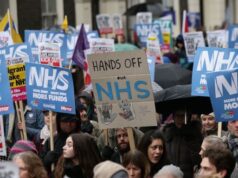Issue: 16
August 2014
This occasional newsletter is researched, written and edited by a group of concerned residents in Ealing, West London who want to preserve our NHS. We view the wholesale engagement of private, for-profit healthcare service suppliers as unnecessary, profligate and dangerous. Process improvement is what is needed in our NHS – not revolution.
Will the NHS be a General Election Issue in May 2015?
With a General Election just 10 months away, the Tories will have to make lots of right noises here in Ealing about the NHS for Angie Bray (MP Ealing Central & Acton) to keep her seat. Nationally the Labour Party could actually get elected if they back a 100% reversal of four years of changes to the NHS. Labour must commit to injecting more money into the service and bring us more in line with state healthcare spend per head in France, Germany, the Netherlands and Belgium. Labour must promise to dismember the 2010 Health and Social Care Act.
Many think the LibDems will be wiped out in the May elections. Nick Clegg MP’s failure to hold the Coalition Government to account over ‘…no top down re-organisation of the NHS’ will be part of this. Shirley William’s surprisingly inept support in the Lords of Section 75 of the 2010 Act – which paved the way for wholesale privatisation of NHS service provision – will also be part of this.
3,950 NHS Staff Made Redundant in 2010 to 2013; Paid Off; and then Rehired
How it can be ethical, legal or sensible to do this is almost beyond belief.
£1.55 Billion Paid Out in NHS Staff Redundancy Payments Since 2011
40 of the redundancy payments to NHS staff in 2013 each exceeded £200,000. This really does seem obscene when compared with nurses being denied even a very modest pay rise.
Audit Commission Raises Concerns About Value For Money at Ealing, Northwick Park and Central Middlesex Hospitals
The Audit Commission’s ‘Auditing the Accounts 2013/14’ report criticises Ealing Hospital NHS Trust and North West London Hospitals NHS Trust (Northwick Park and Central Middlesex Hospitals) for ‘non-standard conclusion of Value For Money arrangements’. The annual accounts for NW London Hospitals NHS Trust are also subject to ‘Referral to the Secretary of State for Health’.
Ealing Clinical Commissioning Group is also criticised in the report because of ‘difficulties making pension-related disclosures in the remuneration report’.
Private Healthcare Companies Invited in Staffordshire to Bid for £1.22 Billion NHS Cancer Care Contracts
Likely bidders for these 10 year contracts include Virgin Care, Care UK and Ramsay Health. Macmillan Cancer Support is advising the four ‘federated’ CGCs who will commission these for-profit companies should one or more of them be selected. NHS England is heavily involved in this initiative.
The Royal College of Radiologists (RCR) writing in ‘The Guardian’ on 5 July 2014 voiced its ‘..fear that there might be unintended consequences’. RCR described this move to privatisation as ‘..a gamble’.
It’s important to note that the four CCGs allied to NHS England do not equate to ‘local GP driven services’ as CCG and NHS colour brochures have been telling us for years now. This is top down privatisation of the NHS – ‘red in tooth and claw’.
The revered publication ‘The Lancet’ takes a dim view of privatisation. Of the Staffordshire tender it says ‘…to try to excise an entire clinical pathway that has several links to other parts of the NHS is an ill-considered fix to a complex issue, and will ultimately not serve those for whom the NHS was first created’. Unison called this procurement process ‘a dangerous experiment’ and Labour’s Andy Burnham MP said that the public had not given the government permission to ‘put the NHS up for sale’.
The Department of Health (DoH) – clearly confused – bleated that NHS competition rules have not changed under this Government. If the DoH can’t see that competition rules changed dramatically with the 2010 Health and Social Care Act and with Section 75, they really do need to go to SpecSavers.
Insane Scheme by NHS Boss to Give Cash Directly to the Mentally Ill
NHS boss Simon Stevens wants vulnerable ‘people with severe and enduring mental health problems’ to be given cash to spend as they see fit on health and social care services. As a registered mental health carer I find this alarming. From my direct experience and drawing on the experiences of other mental health carers, the mentally ill often manage their finances badly, can be manipulated by others into buying alcohol and recreational drugs, give money to strangers and lie about how they have spent cash.
The initiative begins in April 2015 and is called the Integrated Personal Commissioning (IPC) programme. Stevens says that ‘voluntary/Third Sector organisations will be commissioned locally to support personal care planning, advocacy and service ‘brokerage’ for these individuals enrolled in the IPC programme’. I have no idea what this actually means.
He also says that this initiative ‘builds upon, but is in addition to ….the ground breaking Better Care Fund (BCF)’. BCF itself is a worry as it attempts to knit together the NHS, Department of Health and hundreds of Local Authorities in melding together healthcare and social care. The £3.8 billion BCF cash will be spent in order to make savings. A leaked Cabinet report earlier this year reveals concerns about how these savings will actually be achieved.
Improving Access to Psychological Therapies (IAPT) Shines a Ray of Hope on the Mentally Ill
I, along with over 100 others, attended a public interview by BBC’s Andrew Marr of Professors Layard and Clark at LSE on 10 July 2014.
Sixty years ago William Beveridge wrote a report to the British Parliament which provided a summary of principles necessary to banish poverty and ‘want’ from Britain. He described five giants on the road to reconstruction – want, disease, ignorance, squalor and idleness. According to Professor Lord Layard of LSE a missing giant in that list was mental illness. Because this giant was not identified, the mentally ill suffered decades of inadequate or non-existent treatment. Layard estimates there are six million mentally ill people in this country.
The major reasons for decades of inadequate treatment can be grouped into three categories. Firstly the words that have historically been used have not been helpful. ‘Talking Therapies’ have been construed by many as just the simple act of talking to the mentally ill, whereas in reality it comprises specialist interventions by trained therapists. Secondly there has been no definition and monitoring of outputs. Thirdly investment in recruitment and training of therapists has been woefully inadequate until recent years.
Lord Layard has worked with Chartered Clinical Psychologist, Professor David Clark of Oxford University since 2006 to establish evidence-based psychological therapies. They have worked successfully with the previous Labour Government and the Coalition Government in establishing the funding for the training of 6,000 psychological therapists. Those 6,000 therapists have treated 250,000 patients so far, half of whom have ‘recovered’ and for many of the others their lives have improved. The NHS treatment programme is called Improved Access to Psychological Therapies (IAPT).They now want the next elected Government to fund the training of an additional 6,000 therapists. An early supporter of IAPT Alan Johnson MP and the Coalition Government’s current IAPT standard bearer Norman Lamb MP were both in the audience.
Layard is an economist and he emphasise that the implementation of these treatment programmes saves, and will continue to save, money. Most mental illness occurs during people’s working lives (whereas physical illness is most prevalent during retirement). If the mentally ill can be helped so that they can carry out paid employment this will save on benefits payments. A course of IAPT costs £650, but a monthly benefits payment is £615. The mentally ill also often have associated physical illnesses. On average these cost the NHS £2,000 per head per year. Successfully treat a mentally ill patient and the cost of his/her physical health treatment is reduced or eliminated. Dealing with alcohol and drug abuse (often associated with mental illness) costs the country £1 billion annually. The cost of a complete psychological therapy programme would be £0.5 billion and there would be significantly reduced costs for handling substance abuse.
Treatment for mentally ill children has been even more scandalous in England. The earlier an individual is diagnosed and successfully treated the greater the chance of that individual enjoying a ‘happy’ adult life.
When I first heard about Lord Layard’s proposals in 2012 the target number of newly trained therapists was 10,000 and the proposals also included the establishment of 250 new mental health centres throughout England. There was no mention of these centres at the event.
Layard and Clark have just written a book which supports IAPT. It’s called ‘Thrive’ and is published by Allen Lane. ISBN: 9781846146053.
To put all this in a local context, the Ealing Clinical Commissioning Group (ECCG) mental health spend on IAPT with the West London Mental Health Trust in 2013/14 was £2.085 million. The IAPT budget for 2014/15 is £2.110 – a negligible increase. The 2014/5 ECCG budget for learning difficulties is £4.250 million. Public Health England states that there are 36,436 people in the whole of London known to have learning difficulties. HealthWatch Ealing states that there were 34,415 adults who had a common mental health disorder in Ealing in 2012.
However mental health spending as a percentage of total health care spending is the highest in the country in NHS West London at 18.02%. This compares with the lowest in NHS Surrey Heath of 6.55%. It’s hard to believe that the need for mental health care in Ealing is almost three times greater than in Camberley.
Jeremy Hunt Now Threatens Care Homes and GPs with ‘Special Measures’
Mr Hunt is apparently setting up an inspection system for England’s 25,000 care homes. 700 people are to be recruited and those homes ‘failing’ could be placed in Special Measures by Spring 2015.
Hunt is also threatening GPs with Special Measures if they are judged to be failing patients. No doubt inspectors will have to be recruited to inspect the 8,000 GP surgeries in England. The doctors’ union – the British Medical Association – thinks a witch hunt amongst GP surgeries may not be helpful. Some GP surgeries are suffering because of lack of GP or nursing resources and /or ironically struggling because the NHS itself is denying GPs adequate funding and resourcing.
These ‘special’ moves are thought to be inspired by his placing 11 hospitals in Special Measures last year. Three of the 11 have now been taken out of Special Measures – presumably because they are now judged to be performing satisfactorily.
No doubt all of this additional inspecting will be carried out by the Care Quality Commission (CQC). The CQC – infamously accused of cover ups and a bullying culture in 2013 – will soon have much more on its plate. Let’s hope it’s special enough to make a positive contribution to improving primary care and social care in England.
We Must All Fight to Kill Off TTIP
Transatlantic Trade and Investment Partnership (TTIP) is not a negotiation between two competing trading partners, but an assault on European and US societies by transnational corporations seeking to remove regulatory barriers to their activities and to massively undermine democracy.
For many years big business on both sides of the Atlantic has long dreamt of creating a transatlantic free trade zone in which large corporates can make even more money in deregulated markets. Private meetings on the subject are known to have begun in 1995. In 2011 the European Commission and US officials announced the formation of a working group on the topic. Over 100 closed door meetings have taken place since then. Barack Obana is keen to rush TTIP through and no doubt David Cameron and Nick Clegg are too.
TTIP seeks to create new markets by opening up public services and government procurement contracts to competition from transatlantic corporations. This threatens to introduce a further wave of privatisations in key sectors such as health and education. TTIP poses demonstrable and measurable threats to food safety, environmental regulations and jobs.
A key component of TTIP is the Investor-State Dispute Settlement (ISDS) mechanism. ISDS effectively elevates transnational capital to a status equivalent to the nation state itself, and threatens to undermine the basis principles of democracy in the EU and USA alike. ISDS exists in a number of existing international bilateral treaties. These ‘Kangaroo’ secret ISDS tribunals involve a small clique of lawyer arbitrators. The largest ISDS award yet made involved Ecuador paying Occidental Petroleum $1.77 billion for terminating the oil giant’s contract when Occidental broke Ecuadorian law.
Here in Britain TTIP/ISDS, if introduced, threatens to grant US and EU corporations the power to challenge democratic decisions made by the British Government and to claim compensation where those decisions have an adverse impact on their profits. British MEPs and MPs are being denied the chance of knowing what the USA is demanding and no documents relating to the negotiation or development of TTIP/ISDS will be placed into the public domain.
50% of NHS Maternity Units Closed for Periods Because of Lack of Staff or Lack of Beds in 2013
Most closures were for only a few hours, but some lasted over 48 hours. Nottingham University Hospitals NHS Trust’s Maternity Unit closed 97 times! The Royal College of Midwives claims England needs an additional 4,500 midwives.
NHS Ealing Hospital however was fully staffed in 2013 and over 2,900 babies were born there. The unit is modern and includes a new £300,000 birthing centre. However under the NHS NW London Shaping a Healthier Future ‘fatwa’ Ealing Hospital Maternity Unit will be closed down.
Now the Government Wants to ‘Mutualise’ the NHS
Francis Maude MP, the Cabinet Office Minister, is peddling mutualisation as a future ownership/management model for delivering NHS services as well as other public services. He says he wants NHS hospitals to be owned by the people who run them. Mutualisation is a big step down from 100% public ownership. The classic mutual organisation has the majority of its shares owned by customers, staff and suppliers. In real mutuals and co-operatives customers, staff and suppliers are all peers and work together collaboratively and democratically.
However the Coalition Government’s new mutuals will never have more than 25% of shares owned by staff. 25% of any corporate ownership grants virtually zero power to those shareholders. So Francis Maude is being somewhat economical with the truth here. The successful NHS example quoted by right wingers is Hinchingbrooke Hospital in Cambridge. However, although there is significant employee ownership it’s still less than 50%. One suspects that the money men who own 50%+ of the shares hold the whip hand.
The unions’ view is that mutualisation is just privatisation by another name.




